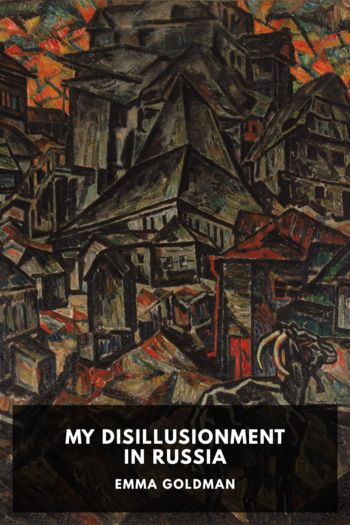Journey from St. Petersburg to Moscow Irina Reyfman (snow like ashes .TXT) 📖

- Author: Irina Reyfman
Book online «Journey from St. Petersburg to Moscow Irina Reyfman (snow like ashes .TXT) 📖». Author Irina Reyfman
After the destruction of the Roman Empire monks in Europe were the guardians of learning and science. But nobody disputed their freedom to write what they wished. In 768 Ambrosius Opert, a Benedictine monk, sending his interpretation of the Book of the Apocalypse to Pope Stephan III and seeking permission to continue his work and to publish it, says that he was the first of writers to seek such permission. “But let freedom of writing,” he continues, “not vanish because abasement was proffered voluntarily.” The Council of Sens in 1140 condemned the views of Abelard, and the Pope ordered the burning of his compositions.97
But neither in Greece nor in Rome do we anywhere find an example that a judge of thought was appointed that he brazenly say: “Seek permission from me if you wish to open your lips for eloquence; reason, science, and enlightenment are stamped for approval by us, and everything that has seen the light without our seal of approval we denounce in advance as stupid, vile, unworthy.” Such a shameful invention was reserved for the Christian clergy, and censorship was contemporary with the Inquisition.
Rather often in reviewing history we find that reason goes with superstition and the most useful inventions stand alongside the coarsest ignorance. At the moment when cowardly mistrust of the object of an affirmation incited monks to establish censorship and to destroy an idea at its birth, at that very time Columbus dared to set off into the unknowability of the seas in pursuit of America; Keppler anticipated the existence of gravitational force in nature, proven by Newton; at that same moment Copernicus, who charted the path in space of the heavenly bodies, was born. But concerning a greater regret about the fate of human reasoning, we shall say that a great idea sometimes gave birth to ignorance. Printing gave birth to censorship; philosophical reason in the eighteenth century produced the Illuminati.
In the year 1479 we find the oldest hitherto known permission to print a book. At the end of the book titled Know Thyself, printed in 1480, the following was added: “We, Maffeo Ghirardi,98 by the grace of God Patriarch of Venice, primate of Dalmatia, after the reading of the above-named gentlemen who bear witness to the composition described above, and after its conclusion and authorization being added, we bear witness that this book is Orthodox and pious.” A most ancient monument to censorship though not the most ancient to madness!
The oldest legislation on censorship known hitherto we find in 1486, published in the same city where printing was invented. The monastic authorities were prescient that it would be the agent of the destruction of their power, that it would hasten the opening up of reason in general, and that power based on opinion rather than on the common interest would find its demise in printing. May we be permitted here to add a historic document, at present still extant as a detriment to thought and to the disgrace of the Enlightenment. A decree on the prohibition to publish Greek, Latin, and other books in the vernacular without the prior approval of scholars, 1486.*99
“Berthold, archbishop by divine grace of the holy precinct of Mainz, archchancellor and Prince-Elector in Germany. Although the divine art of printing makes it possible in the acquisition of human learning to obtain books pertaining to various sciences more bountifully and more freely, it has nonetheless come to our attention that certain people, induced by the wish for vain fame or wealth, abuse this art and what was bestowed for education in human life they turn into ruin and slander.
“We have seen books concerning sacred duties and the rituals of our confession translated from Latin into the German language circulate, as is inappropriate for the sacred law, in the hands of simple folk. And what, then, is to be said about the sacred prescriptions of rules and laws? Although they were written carefully and intelligently by people expert in legal study, the wisest and most intelligent possible, the science is in itself so difficult that the entire life of a most eloquent and learned person would scarcely be sufficient.
“Some stupid, brazen, and ignorant people take it upon themselves to translate into the vernacular these sorts of books. Many learned people on reading these translations admit that owing to their considerable improper and poor use of words they are more obscure than the originals. What would we say about works in other fields in which they often mix the false, introduce mistaken appellations and for which more buyers are found the more they attribute their own ideas to famous writers.
“Let these translators—if they love the truth—no matter the intention with which they have acted, good or bad, let them tell us whether the German language is suitable for transposing into it what the most elegant Greek and Latin writers have written exquisitely and intelligently on the loftiest considerations of the Christian faith and about other sciences? One is obliged to admit that owing to its poverty our language is barely sufficient, and for that reason they have to devise in their heads unknown names for things; and even if they use the old ones it will be by corrupting their true meaning, the thing we fear most in Holy Scripture given their importance. For who will reveal the true meaning to the uncouth and ignorant people and the female





Comments (0)